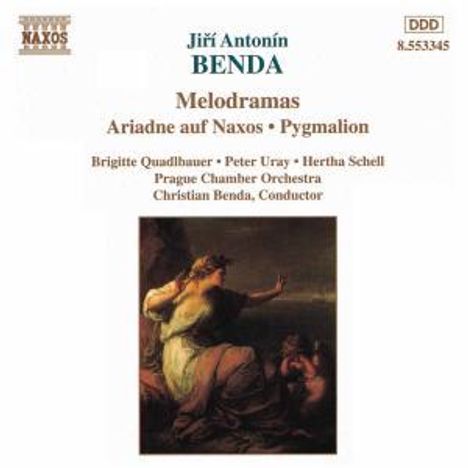Georg Anton Benda: Ariadne auf Naxos (Melodram) auf CD
Ariadne auf Naxos (Melodram)
Herkömmliche CD, die mit allen CD-Playern und Computerlaufwerken, aber auch mit den meisten SACD- oder Multiplayern abspielbar ist.
(soweit verfügbar beim Lieferanten)
+Pygmalion (Melodram)
- Künstler:
- Brigitte Quadlbauer, Peter Uray, Hertha Schell, Prague Chamber Orchestra, Christian Benda
- Label:
- Naxos
- Aufnahmejahr ca.:
- 1994
- Artikelnummer:
- 7665911
- UPC/EAN:
- 0730099434522
- Erscheinungstermin:
- 29.3.1996
Mit seiner Ariadne legte Benda den Grundstein für ein Genre, das ohne wesentliche Veränderungen bis ins neunzehnte Jahrhundert fortbestand. Die Wertschätzung, die Benda entgegengebracht wurde, geht nicht nur aus Mozarts Zeugnis hervor, sondern auch aus Berichten wie dem von Christian Gottlob Neefe, Beethovens Lehrer in Bonn, der 1777 im Gothaer Theater Journal erschien:
"Bewunderung und Respekt packen mich, wenn ich eine Partitur von Benda sehe oder eine Aufführung eines seiner Werke höre. Seine Ariadne - welch glühende, erhabene Phantasie und reiche Erfindungskraft! Wie zutiefst ist alles überdeckt! Wie tief alles im Herzen empfunden wird! Bald schreitet die Musik voran, jetzt mit der Deklamation, jetzt begleitend, um die Gefühle und die daraus resultierende Handlung vorzubereiten, zu unterstützen, zu erheben und weiterzuführen, wenn der Schauspieler oder die Schauspielerin der inneren Anspannung keinen Ausdruck mehr geben kann. Es ist alles so neu und doch so wahr, so vielfältig und doch so kongruent."
Pygmalion, eine Adaption von Rousseaus bahnbrechendem Werk, wurde am 20. September 1779, nach Bendas Rückkehr aus Wien, in Gotha uraufgeführt. Die Geschichte, die wiederum ihren Platz im Werk Ovids hat, handelt von Pygmalion, dem König von Zypern, der durch die Zügellosigkeit der Frauen von Amathusa, die als die Propoetiden bekannt sind, so gegen die Frauen aufgebracht war, dass er der Liebe entsagte und beschloss, unverheiratet zu bleiben. In der Abgeschiedenheit beschäftigte er sich mit der Bildhauerei und schuf eine Statue, in die er sich verliebte. Er ruft die Göttin der Liebe an, die Statue zum Leben zu erwecken, und seine Bitte wird erhört, was ihm in dieser Version der Geschichte das endgültige Glück bringt.
Product Information
With his Ariadne Benda laid the foundations for a genre that continued without significant changes into the nineteenth century. The esteem in which Benda was held is evident not only from Mozart's testimony, but from accounts such as that from Christian Gottlob Neefe, Beethoven's teacher in Bonn, which appeared in 1777 in the Gotha Theatre Journal:
Admiration and respect seize me whenever I see a score by Benda or hear a performance of one of his works. His Ariadne -what glowing lofty fantasy and rich power of invention! How profoundly everything is covered over! How profoundly everything is felt in the heart! Soon the music moves forward, now with the declamation, now accompanying it, to prepare the feelings and the action resulting from them, to support, to elevate and to lead on, when the actor or actress can give no further expression to inner stress. It is all so new and yet so true, so diverse and yet so congruent.
Pygmalion, an adaptation of Rousseau's seminal work, was first performed at Gotha on 20th September 1779, after Benda's return from Vienna. The story, which again has its place in the work of Ovid, deals with Pygmalion, King of Cyprus, who, through the licentiousness of the women of Amathusa, known as the Propoetides, had so taken against women that he had renounced love and resolved to remain unmarried. In seclusion he occupied himself with sculpture, creating a statue with which he fell in love. He calls on the goddess of love to give life to the statue and his petition is heard, bringing him, in this version of the story, final happiness.
Tracklisting
-
1 Track 1
-
2 Track 2
Mehr von Georg Anton Benda
-
Georg Anton BendaCembalokonzerte in f, F, G & hSuper Audio CDAktueller Preis: EUR 7,99
-
Georg Anton BendaCembalosonaten Nr.1-6 (1757)CDAktueller Preis: EUR 19,99
-
Georg Anton BendaViolakonzert in FCDAktueller Preis: EUR 14,99
-
Georg Anton BendaSammlung vermischter Clavier- und Gesangstücke für geübte und ungeübte SpielerCDVorheriger Preis EUR 19,99, reduziert um 0%Aktueller Preis: EUR 7,99





